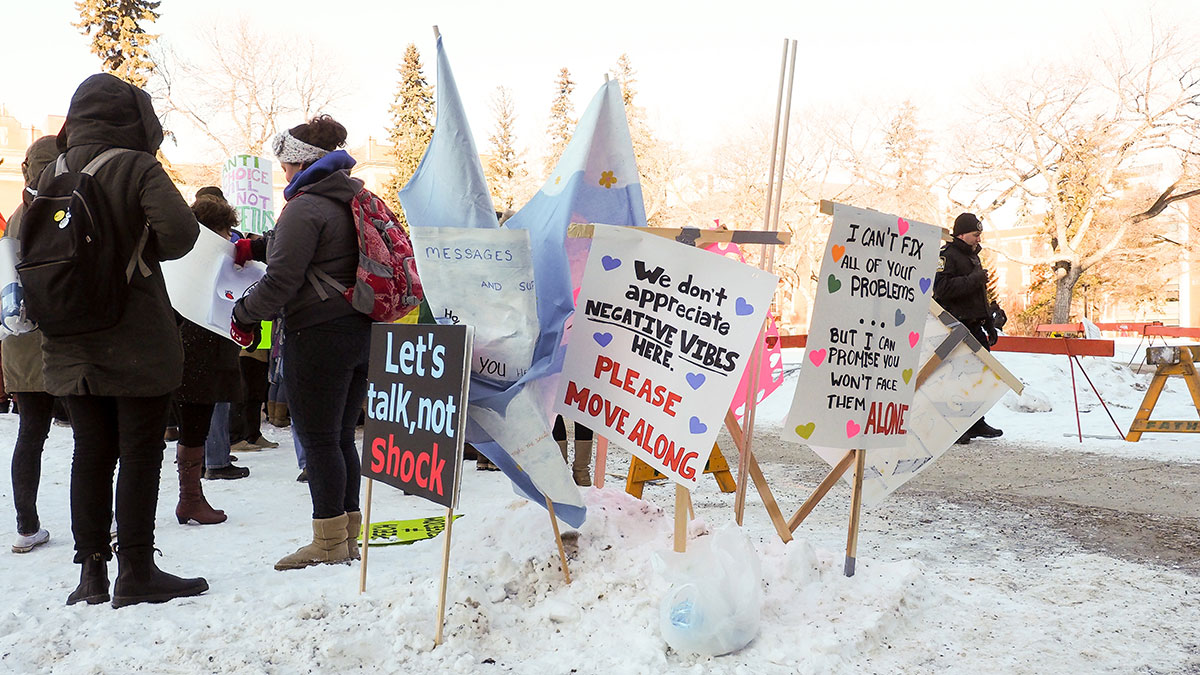 Ab Sch
Ab SchWhile it’s university professors that assign letter grades to students, it seems the 2015 Campus Freedom Index has followed suit for the University as a whole.
Authors Michael Kennedy and John Carpay have decided to award the University of Alberta and the Students’ Union with embarrassingly low grades based on dedication to freedom of speech. The university’s policies received a B, and the Index found the university’s practices so viciously silencing that they warranted an F. The SU also fails to impress, receiving an F for policies and a C for practices. This is equal parts alarming and hilarious.
So how exactly are our two governing bodies failing us so spectacularly, and do they deserve these grades? According to Student Group Services there are over 400 active student groups on campus, but the Index justifies the marks almost exclusively using Pro-Life’s educational display-turned-scandal of last semester. While it’s true that this was the most high-profile showcase of freedom of speech last year, a single instance dictating a complete portrayal is unwarranted.
JCCF explained why they graded a C to SU practices on page 138 of the Index: “The authors are not aware of any instances of the Students’ Union censoring speech on campus, or discriminating against students or student clubs on the basis of belief, opinion, philosophy or expression. However, the Student Union policies facilitate and enable censorship and discrimination”.
This doesn’t make sense. It’s an extrapolation, and condemnation based on speculation using only a single event.
Furthermore, it’s somewhat ironic that the Campus Freedom Index is penalizing the University and SU for allowing students to disagree with the Pro-Life opinion. Page five of the Index justifies an F for university practices by saying “The University of Alberta condoned the bullying, censorship and intimidation of one of its own student groups throughout the 2014-15 school year.” However, if the university and SU didn’t allow pro-choice supporters to voice their opinion, this would also be censorship of freedom of speech.
This isn’t to say that all acts expressing the pro-choice opinion were necessary or without fault. Students tearing down Pro-Life’s advertising posters is against the Code of Student Behavior, and administration should have enforced consequences violating the university’s own policies. However, the “mob” that was accused of “censoring” the pro-life display was essentially just students engaging in their own right to freedom of speech. The Index, intentionally or unconsciously, overlooks this.
Interestingly, John Carpay (Calgary lawyer, co-author of the Campus Freedom Index, founder and president of the Justice Center for Constitutional Freedom which released the Index), is the one representing three UAlberta Pro-Life members in a lawsuit against the University of Alberta. Amberlee Nicol (President of UAlberta Pro-Life), Kianna Owen (VP Membership), and Cameron Wilson are seeking court action to protect and defend their freedom of speech on campus. While the fact that Carpay is representing the group appears on the JCCF website, it appears nowhere in the report, and represents an enormous conflict of interest.
While the university probably doesn’t deserve to be evaluated so poorly and the Index appears not as objective as it should be, the Index does serve some use. It highlights the inexcusable violation of the Code of Student Behavior by the university itself, as well as the subjective policies of the SU – issues for which both parties need to be held responsible . Also, being directly compared to other universities promotes accountability, and offers incentive to improve by appealing to the competitive nature at the core of every university and committee. Who doesn’t want to be the best?
Kennedy and Carpay seem to think think that the University of Alberta is terrible at promoting freedom of speech because of one isolated incident. But that’s OK! They have the right to express their opinion, and nevertheless we retain the right to express ours. That’s how freedom of speech works.




